Sports
Rethinking the coming-out template for athletes
Despite success stories, Michael Sam lingers as cautionary tale
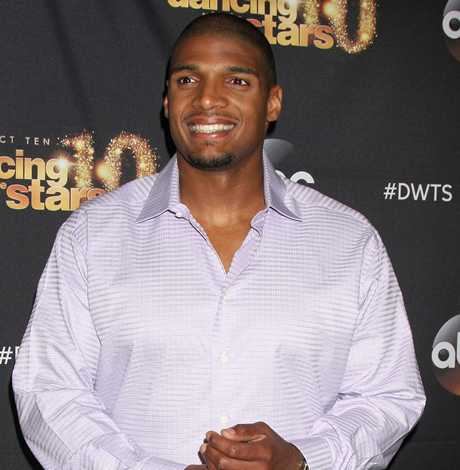
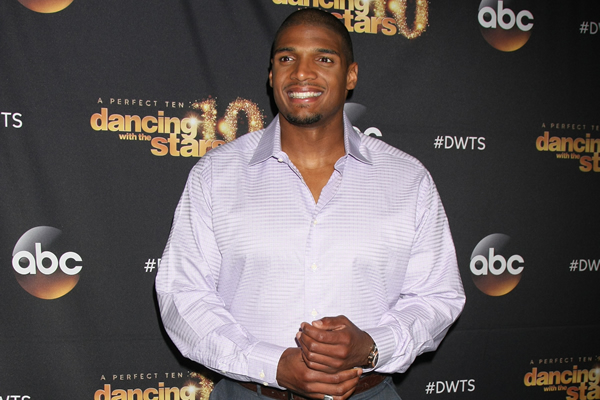
Michael Sam never played a down in the NFL after coming out and being drafted. (Photo by kathclick; courtesy Bigstock)
Tanner Williams didn’t have a typical coming-out sports story. In 2014, the 22-year-old Norman, Okla., resident, a pole vaulter on the University of Oklahoma track and field team, posted on Facebook that he’d gotten engaged to Scott Williams, his boyfriend of less than a year.
He wrote about the experience in a more prominent coming-out moment when Outsports, an LGBT sports news site, published his story in April 2015.
Even in Oklahoma, which Williams himself (he’s a native of Ardmore, Okla.) admits is “a very conservative and religious state,” the experience has been overwhelmingly positive, he says.
“It’s probably been one of the greatest things I’ve ever done,” he says. “It helped me, my family, my friends to know that it’s OK to be gay. It made a huge impact in Oklahoma with the inclusion-in-sports aspect. … I got a lot of positive attention. It’s all been great.”
Williams had read other coming-out stories on Outsports and became friendly with Jim Buzinski, who co-founded the site in 1999 with Cyd Zeigler, Jr.
“I think I just messaged him thanking him for all the stuff he’s done and told him, ‘If you ever want to share my story, I could probably come up with the courage,’” Williams says.
The only thing he might have done differently is to have come out sooner.
“There were a few negative comments, but it was pretty mild,” he says. “After the Outsports piece ran and some other papers here in Oklahoma wrote about it, there were a few comments. People said, ‘Why is this news?’ and a few things like that. But then I was elected co-captain of my team and it just showed that they respected me and being gay has nothing to do with what kind of person or athlete you are. It was even more positive. It got an overwhelming amount of attention through Outsports.”
But how typical is Williams’ experience? Buzinski says in 16 years of telling the coming-out stories of “probably a couple hundred” athletes on “all levels,” there’s rarely been any issue.
“We leave the final decision up to the athlete,” Buzinski says. “The bottom line for them is once you come out, you can’t go back in. If you’re going to come out, even in some of the smaller sports, you have to know that there’s going to be different levels of attention and you have to be ready for that. Most of the time they write their own stories and even if we work, shape and edit them, they have to sign off on the final version. It’s their story to tell.”
He says a few times they’ve had athletes ready to come out, but he and Zeigler have urged them to wait.
“We’ve never pushed,” Buzinski says. “It’s frustrating to us as journalists, but we’ve never forced [anyone].”
He says negative feedback has been rare. He recalls “maybe two or three” who asked later for their stories to be removed from the Outsports website, which is not practical since the pieces live on in web archives. He guesses “less than” five have had second thoughts after the fact.
With lots of positives to point to — everything from Jason Collins becoming the first openly gay athlete to play in the NBA to 41 out LGBT athletes competing at this month’s Rio Olympics — and LGBT rights overall making previously unheard of strides in the U.S. and around the world, some assume there’s little risk in coming out.
Yet the sting of Michael Sam’s aborted NFL career is still fresh and there’s also a sense in some circles that things aren’t always so rosy for out athletes once the media buzz and excitement wears off.
Robbie Rogers, a soccer midfielder for the Los Angeles Galaxy who came out in 2013, told the Chicago Tribune this summer he assumed he was on the outer cusp of a sort of domino effect of male athletes coming out that never materialized. Despite many out female athletes in the WNBA, Rogers is now the lone openly gay male athlete in the U.S.’s five major pro sports leagues (the NBA, MLB, NHL, NFL and MLS).
Sam came out to great fanfare in 2014 with ESPN, New York Times and Outsports profiles (Zeigler writes of how it all went down in a lengthy Outsports piece called “The Eagle Has Landed”). He was drafted by the St. Louis Rams in the seventh round of the 2014 draft but was cut at the end of training camp before ever playing a game. He also had a short stint with the Dallas Cowboys’ practice squad but was waived. In 2015, he played a single game with the Montreal Alouettes becoming the first openly gay player to play in the Canadian Football League before leaving citing “mental health” concerns.
Since then, he’s made many appearances for LGBT rights, did a season of “Dancing With the Stars,” appeared in a documentary on OWN (the Oprah Winfrey Network) and returned to the University of Missouri (his alma mater) to pursue a master’s degree. His NFL career is, for all practical purposes, likely over.
Although stressing he has “no regrets whatsoever,” as he told Dan Patrick on his eponymous show last year, Sam has now said in several interviews that he’d likely be in the NFL today if he’d not come out.
“It probably would have been better for me if I didn’t come out,” he told Patrick. “I would be on a roster.”
He also told Edge of Sports, “I think if I never would have came out, never would have said those words to the public, I would still be currently in the NFL. But because of me saying those words, I think it could have played a huge part in my current situation.”
Even Zeigler agrees.
“He would have played in the NFL last season if he hadn’t come out,” Zeigler wrote in a September 2015 Outsports column. “The NFL teams have, individually and collectively, discriminated against Sam because he is an openly gay man. Homophobic jerks keep saying that’s just sour grapes, but it’s not. He’d be in the NFL right now if he hadn’t come out.”
Sam parted ways with former agents Cameron Weiss and Joe Barkett and Howard Bragman, the gay PR guru who masterminded Sam’s coming-out media strategy. Bragman, with whom Sam had a profanity-strewn clash in clips seen in the OWN documentary, is laying low on the matter now. He declined a Blade interview request.
Buzinski says it’s hard to say to what degree homophobia might have hurt Sam’s career. There were several contributing factors — the Rams having been well stocked in defense (Sam is a defensive end) at the time of the draft, perhaps most notably.
“There were probably X number of teams that wouldn’t touch him because he was gay, but not all 32,” he says. “The NFL has a ways to go, but if teams thought Michael Sam could have helped them, they would have picked him. I don’t believe it was exclusively because he was gay. That’s something that can never be fully proven or disproven. It’s an assertion that can never be knocked down or supported. There are hundreds of guys who are flushed out of the NFL every year for all kinds of reasons.”
Christina Kahrl, an ESPN sportswriter who’s transgender, isn’t so quick to let the NFL and some of its other franchises off the hook.
“I’m a Raiders fan so I’m going to tell you this as an LGBT person,” Kahrl told the Blade. “When Michael Sam was up, the Raiders were one of the worst defensive teams in the league. They should have taken a chance on him. You couldn’t get any worse than the Raiders were at the time, so if he’s out there and freely available, for Christ’s sake, sign the guy. Clearly there were some management problems. There’s no excuse why a team like the Raiders wouldn’t have taken a chance on Michael Sam.”
Kahrl says Sam’s advisers had him doing too many other things when he should have been focusing on football, a point he made himself to Winfrey.
“All of a sudden, he was everywhere doing everything, every gala, every GLAAD and HRC thing, he was dancing with the stars,” Kahrl says. “My throwaway line from that was we saw Michael Sam dancing with the stars before we even saw his first sack dance. He was famous before he ever did the thing he was supposed to be famous for doing, being a football player.”
And now with Jason Collins retired from the NBA, Sam’s never having played a down in a regular-season NFL game, David Denson, a 21-year-old outfielder who plays for the Minor League baseball team the Wisconsin Timber Rattlers, is the only other pro male out athlete to have come out. The wave many expected never happened.
“I’m at the stage where it’s kind of stupid,” Robbie Rogers told the Chicago Tribune in June. “I would never force anyone out and everyone has their own time, but come on, it’s 2016. A lot has changed in the United States and around the world. Obviously there are a lot of rights to fight for and a lot of hate here toward the LGBT community, but it’s an opportunity to be a role model for millions and change the lives of kids not only in sports, but in our culture and around the world. It’s a little disheartening.”
Gospel singer Jennifer Knapp, who says she experienced “total blackout” from the Christian music industry after coming out in 2010, knows what it’s like to go from industry darling to non-entity. Despite a handful of gospel singers who’ve come out in recent years, none were invited to the CCM United industry celebration concert last year that celebrated 40 years of contemporary Christian music. She says anytime money’s involved, homophobia is likely present.
“Sexual orientation is a very real factor but it’s one of those things that’s very difficult to put your finger on how much it affects things,” Knapp says. “You can say, ‘Well, [Michael Sam] would have been higher in the draft pick, but they already had a strong defense,’ or in my case, they have the cover of saying, ‘Well, we don’t stock her old albums because she’s not relevant in this field anymore, she’s not making gospel music,’ and I would agree with that to a point, but what you see happening — and this is a very difficult thing to measure — is when they try to minimize the impact that person had before they came out. … If your name is mentioned at all, it’s, ‘Oh where did she go,’ ‘What a waste,’ ‘What a black hole,’ ‘She’s not relevant,’ and when you couple that with a few things that may be true, it becomes this really murky thing that’s hard to pin down. Was Michael Sam pushed out of football because of his sexual orientation? Only the long run will tell.”
Tanner Williams disagrees and wonders why anyone in any field would want to be with people who don’t support being out.
“I think he’s throwing blame because he’s not in the NFL,” Williams says. “There are plenty of athletes out there who are very successful.”
Kahrl mentions athletes such as Collins and Denson who’ve been successful, but says several factors contributed to Sam’s trouble — getting involved in too many outside activities when he should have been concentrating on football, lingering anti-LGBT bias in football and the timing of his coming out.
“You might have said in 2013, 2014 that we were riding this wave that was going to go up and only getting better and instead what we’ve seen is this kind of chilling effect where the players in the professional leagues are more reticent in coming out,” she says. “The Michael Sam situation is a pretty clear indication of what I would call an observer’s paradox where all of us in the community want out athletes and want to get to the point where it goes to being no big deal.”
So what went wrong?
“I think a lot of people had a lot of good intentions from his advisers to people in the community to people in pro sports in general who all wanted the best thing and it still ended up getting screwed up,” Kahrl says. “It had nothing to do with Michael Sam’s ability to play football. He was doing all these wonderful things, but they had nothing to do with playing football and that was particularly frustrating and it had to have been immensely frustrating for him as well.”
Sports
Brittney Griner, wife expecting first child
WNBA star released from Russian gulag in December 2022
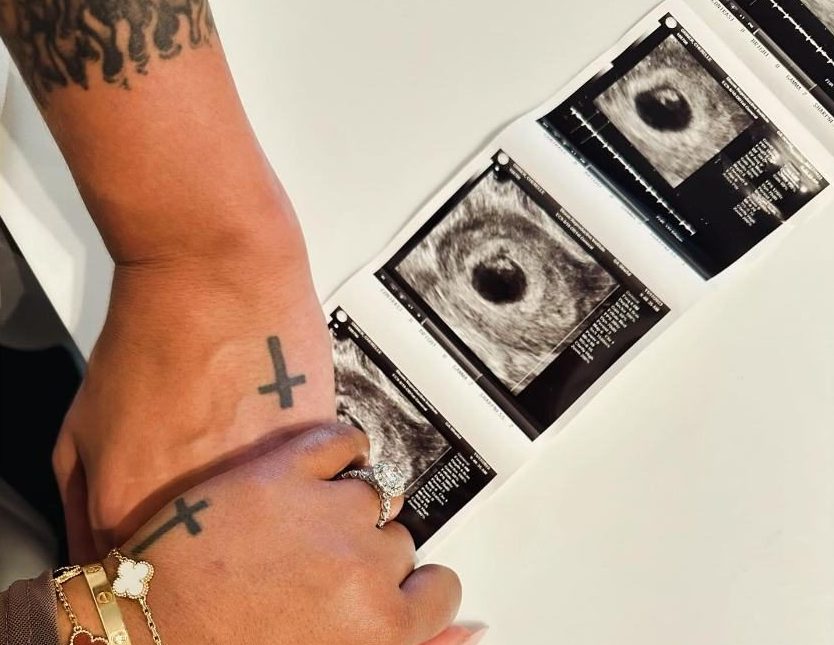
One year after returning to the WNBA after her release from a Russian gulag and declaring, “I’m never playing overseas again,” Phoenix Mercury star Brittney Griner and her wife announced they have something even bigger coming up this summer.
Cherelle, 31, and Brittney, 33, are expecting their first child in July. The couple shared the news with their 715,000 followers on Instagram.
“Can’t believe we’re less than three months away from meeting our favorite human being,” the caption read, with the hashtag, #BabyGrinerComingSoon and #July2024.
Griner returned to the U.S. in December 2022 in a prisoner swap, more than nine months after being arrested in Moscow for possession of vape cartridges containing prescription cannabis.
In April 2023, at her first news conference following her release, the two-time Olympic gold medalist made only one exception to her vow to never play overseas again: To return to the Summer Olympic Games, which will be played in Paris starting in July, the same month “Baby Griner” is due. “The only time I would want to would be to represent the USA,” she said last year.
Given that the unrestricted free agent is on the roster of both Team USA and her WNBA team, it’s not immediately clear where Griner will be when their first child arrives.
The Griners purchased their “forever home” in Phoenix just last year.
“Phoenix is home,” Griner said at the Mercury’s end-of-season media day, according to ESPN. “Me and my wife literally just got a place. This is it.”
As the Los Angeles Blade reported last December, Griner is working with Good Morning America anchor Robin Roberts — like Griner, a married lesbian — on an ESPN television documentary as well as a television series for ABC about her life story. Cherelle is executive producer of these projects.
Next month, Griner’s tell-all memoir of her Russian incarceration will be published by Penguin Random House. It’s titled “Coming Home” and the hardcover hits bookstores on May 7.
Sports
Applause and criticism for Staley’s trans-inclusive stance
South Carolina Gamecocks women’s coach made comments on Sunday
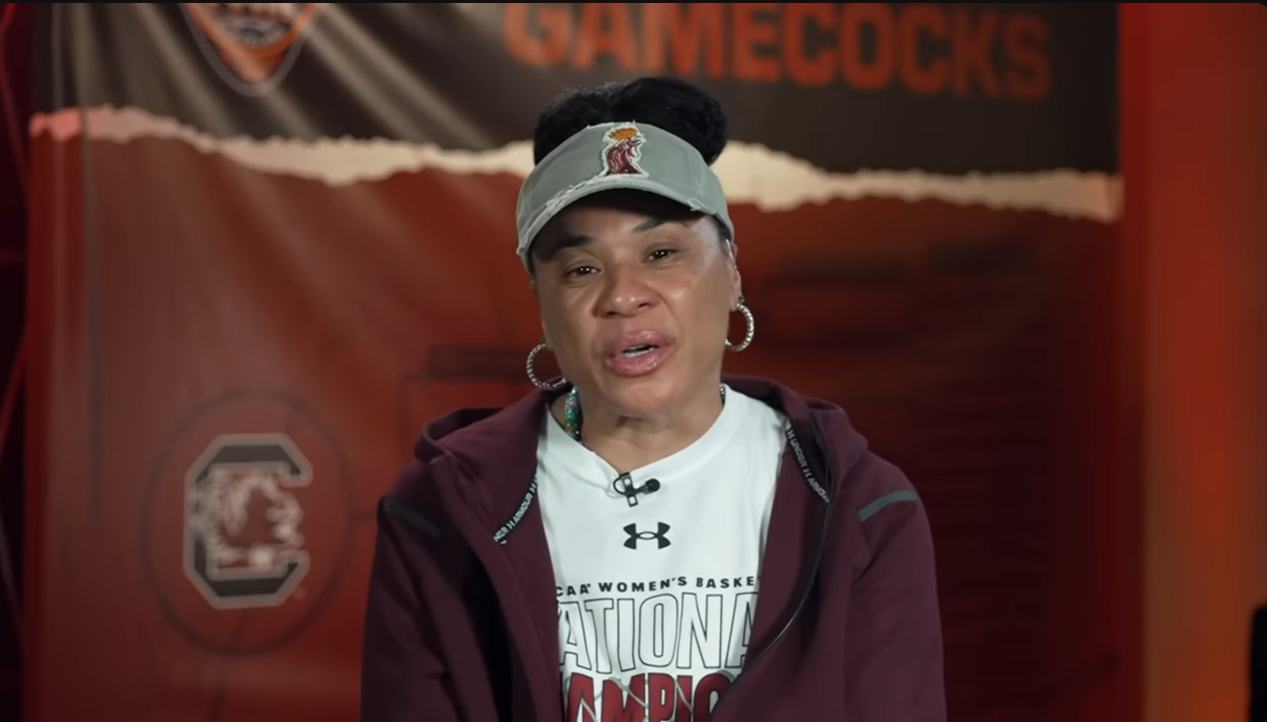
If not for a conservative transphobic blogger, this moment should be a celebration of NCAA women’s basketball coach Dawn Staley and the women of the South Carolina Gamecocks.
On Sunday, they concluded their undefeated season with a decisive win and a championship title. But when Staley faced reporters before that big game, Outkick’s Dan Zakheske asked her an irrelevant, clickbait question about transgender women in sports, referring to them as “biological males.”
Staley could have ignored the question, or stated she had no opinion, but instead the legendary coach offered a crystal clear endorsement of trans women competing in women’s sports, something outlawed in her home state of South Carolina for girls in kindergarten through college.
“I’m of the opinion,” said Staley, “If you’re a woman, you should play. If you consider yourself a woman and you want to play sports or vice versa, you should be able to play. That’s my opinion.”
Zakheske clearly wasn’t satisfied with that declaration of allyship and Staley swiftly cut him off.
“You want me to go deeper?” she asked.
“Do you think transgender women should be able to participate,” he started to say, when the coach stole the ball and took it downtown on a fastbreak. “That’s the question you want to ask? I’ll give you that. Yes. Yes. So, now the barnstormer people are going to flood my timeline and be a distraction to me on one of the biggest days of our game, and I’m okay with that. I really am.”
Staley is herself a Hall of Fame player a leading voice for diversity.
Reaction to her comments were swift, from LGBTQ rights organizations, athletes and inclusion opponents.
“Coach Staley simply spoke the truth that trans women are women and should play if they want,” said Sarah Kate Ellis, president and CEO of GLAAD, in a post on Instagram. “All of us can take a page from Coach Staley’s playbook as a sports leader and as a person of high integrity guided by faith, compassion and common sense.”
A White House pool reporter revealed President Joe Biden called Staley Sunday evening to congratulate her and the Gamecocks on their championship win. But it’s not clear if she and the president, an outspoken supporter of trans rights, discussed her remarks on trans athletes.
A number of Black leaders in the LGBTQ movement applauded Staley for taking a stand.
“Coach Staley has always been a trailblazer, but she’s also shown that true leadership is about advancing justice and equality for everyone,” said Human Rights Campaign President Kelley Robinson. “By expressing her full-throated support for transgender athletes’ inclusion in sports, she’s sending an important message — our shared humanity matters.
“Coach Staley showed courage and vulnerability, in choosing to answer the question and make a powerful statement of support for trans people on one of the biggest days and biggest stages in sports history,” said Kierra Johnson, executive director of the National LGBTQ Task Force, in a statement. “Not only does that make her a leader we can all aspire to like, it makes her a class act. She has etched her legacy in the history books with her play, her coaching, her heart and her smarts.”
In congratulating Staley on her championship title victory, Dr. David J. Johns, the CEO and executive director of the National Black Justice Coalition, also commended her for “her unwavering advocacy and support for transgender people in sports.”
“In a time when transgender athetes face unjust scrutiny, discrimination and exclusion from the National Association of Intercollegiate Athletics, her courage to speak truth to power and in support of inclusion and fairness sets a powerful example for us all, and is a testament to her integrity and compassion.”
The NBJC leader was referring to Monday’s announcement by the NAIA, the governing body of athletic programs at small colleges nationwide, voting 20-0 to essentially ban trans women from competing with other women beginning Aug. 1, as ESPN reported.
“It is a shocking and devastating development that the NAIA, an organization that has done so much to open doors, is now slamming those doors shut on transgender athletes,” said Sasha Buchert, Lambda Legal’s senior attorney and director of the organization’s nonbinary and trans rights project.
“Instead of standing up in support of transgender young people, the NAIA has simply turned its back on them — permanently depriving them of the benefits of competition. Would that they had the courage of victorious University of South Carolina women’s basketball coach Dawn Staley, who didn’t miss a beat in clarifying that transgender women should be able to play.”
However, praise for Staley’s stance was not universal.
Riley Gaines, failed former college swimmer and paid shill for the anti-inclusion organization, Independent Women’s Forum, called Staley “entirely incompetent or a sell-out” on Fox News. “Personally, I don’t think she believes what she said.”
Gaines has turned her fifth-place tie with out trans NCAA champion Lia Thomas into a career as a crusader against inclusion and a former advisor to the presidential campaign of Florida Gov. Ron DeSantis.
Val Whiting, a former Stanford University and professional women’s basketball player, tweeted her strong disagreement with Staley. “A lot of my basketball sisters feel differently but trans women do not belong in women’s sports. It’s not fair nor safe for biological women. There has to be another solution for trans women to be able to compete athletically besides having them compete against biological women.”
A lot of my basketball sisters feel differently but trans women do not belong in women’s sports. It’s not fair nor safe for biological women. There has to be another solution for trans women to be able to compete athletically besides having them compete against biological women.
— Val Whiting (@iamcoachval) April 7, 2024
Zaksheske’s Outkick colleague, anti-trans pundit David Hookstead, also went all-in with a transphobic post.
“Dawn Staley says she supports men who identify as women competing against real women in sports. Her view could literally destroy women’s basketball forever. Why won’t more people stand up for women?”
Dawn Staley says she supports men who identify as women competing against real women in sports.
— David Hookstead (@dhookstead) April 6, 2024
Her view could literally destroy women’s basketball forever.
Why won’t more people stand up for women? pic.twitter.com/2A59KTqvHb
Hookstead then boasted that Staley blocked his account.
Republican South Carolina Congresswoman Nancy Mace retweeted Zaksheske’s account of his interaction with Staley, calling her support of trans athletes “absolute lunacy.” That in turn won praise from Caitlyn Jenner, who retweeted Whiting and posted her thanks to Mace, along with this comment: “There is nothing complicated about this issue!”
What is complicated is that Jenner has never explained why she has competed with cisgender women in golf ever since her transition almost a decade ago.
You’re a hypocrite. pic.twitter.com/42DKwA9jmF
— Art Candee 🍿🥤 (@ArtCandee) April 7, 2024
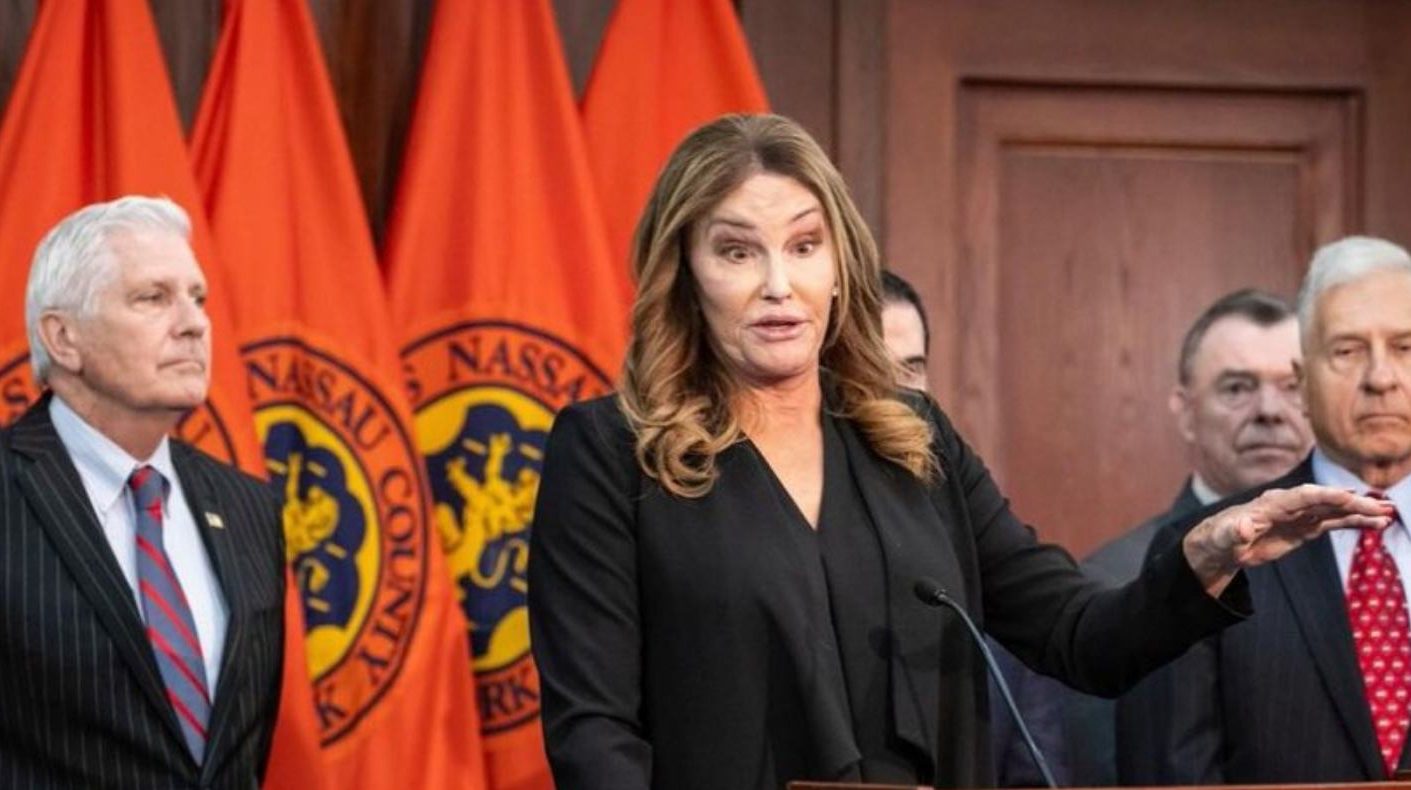
Caitlyn Jenner flew from Malibu to New York this week to join her fellow Republicans in their nationwide quest to keep transgender girls and women from competing in sports with other women.
“Let’s stop it now while we can,” said the Olympic gold medalist, at a news conference carried live by Fox News Channel.
Republican Nassau County Executive Bruce Blakeman organized the event so that Jenner could speak in support of his February executive order banning trans athletes at more than 100 county-owned facilities.
“Trans women are competing against women, taking valuable opportunities for the long-protected class under Title IX and causing physical harm,” said Jenner without providing supportive evidence of her claim. Jenner said the ban would defeat “the woke agenda.”
Her comments drew praise from former NCAA swimmer and paid shill Riley Gaines, who represents the Independent Women’s Forum and has also worked with the failed presidential campaign of Republican Gov. Ron DeSantis of Florida on his anti-trans athlete platform.
We stand with Executive Blakeman as he faces shameful retaliation from @TishJames for merely protecting sports on the basis of sex
— Riley Gaines (@Riley_Gaines_) March 18, 2024
Thanks to you both, @Caitlyn_Jenner @NassauExec !!👏🏼 https://t.co/vAsWfayI7l
“If the left wants to fight this battle on this hill, it’s a losing battle,” said Jenner. “We will win the battle.” She claimed she spoke on behalf of women and girls, contradicting her past statements in support of trans girls competing according to their gender identity and despite the fact she herself still competes in women’s sports.
Shortly after the ban was announced last month, New York State Attorney General Letitia James and New York Gov. Kathy Hochul, both Democrats, denounced it and accused Blakeman of “bullying trans kids.”
James called the order “transphobic and deeply dangerous,” and argued that it violates the state’s anti-discrimination laws. The state attorney general challenged it in court March 1 with a “cease and desist letter,” demanding that Blakeman rescind the order, saying it subjects women’s and girls’ sports teams to “invasive questioning.”
As the Los Angeles Blade reported, Blakeman’s legal team countered with its own lawsuit on March 5, claiming her cease and desist letter violates the 14th Amendment’s equal protection clause.
“Not only was the executive order legal, but we had an obligation to defend it,” Blakeman said Monday.
The order has also been challenged by the New York Civil Liberties Union, which filed suit last week on behalf of a women’s roller derby league based in Nassau County that welcomes trans women and would be barred from using the county’s facilities by Blakeman’s executive order.
Just days before the Long Island news conference, Jenner joined Olympian Sharron Davies, who also campaigns against trans inclusion in sports, for an conversation with a British newspaper, the Telegraph, which has been outspoken against trans inclusion.
They recalled that in their day, tests to determine sex were mandatory in order to compete, and Jenner said she has been “pushing” for sex tests to return to sports, decades after sports organizations around the world abandoned the practice because they were unreliable. “If they continue down this road, it will be pretty much the end of women’s sport as we know it.”
“I can still hit a golf ball 280 yards,” Jenner continued, not mentioning she plays from the ladies’ tee. She did however opine about not being “a real woman,” acknowledging that many trans women disagree with her view.
“They keep saying, ‘Oh, I’m a real woman, I’m a real woman,’ and I’m going, ‘No, you’re not,’” said Jenner. “I will use your preferred pronouns, I will treat you as a female, you can run and dress and do whatever you want, I have nothing against that, it’s fine, but biologically you’re still male.”
She added: “Let me explain — I am biologically male, OK? I’m XY. There’s nothing I can do to change that. If you believe in gender dysphoria, and I think most people do realize it’s not a disease, it’s a mental condition, just like some people are left-handed and some people are right-handed, it’s kind of the way you’re born and I’ve dealt with it my entire life.“
“I consider myself a trans person, I am still genetically male, I changed all of my ID right down to my birth certificate so technically yes, I am female, but on the other hand I know I’m not.”
Related:
-

 State Department2 days ago
State Department2 days agoState Department releases annual human rights report
-

 Maryland4 days ago
Maryland4 days agoJoe Vogel campaign holds ‘Big Gay Canvass Kickoff’
-

 Politics3 days ago
Politics3 days agoSmithsonian staff concerned about future of LGBTQ programming amid GOP scrutiny
-

 The White House1 day ago
The White House1 day agoWhite House debuts action plan targeting pollutants in drinking water











